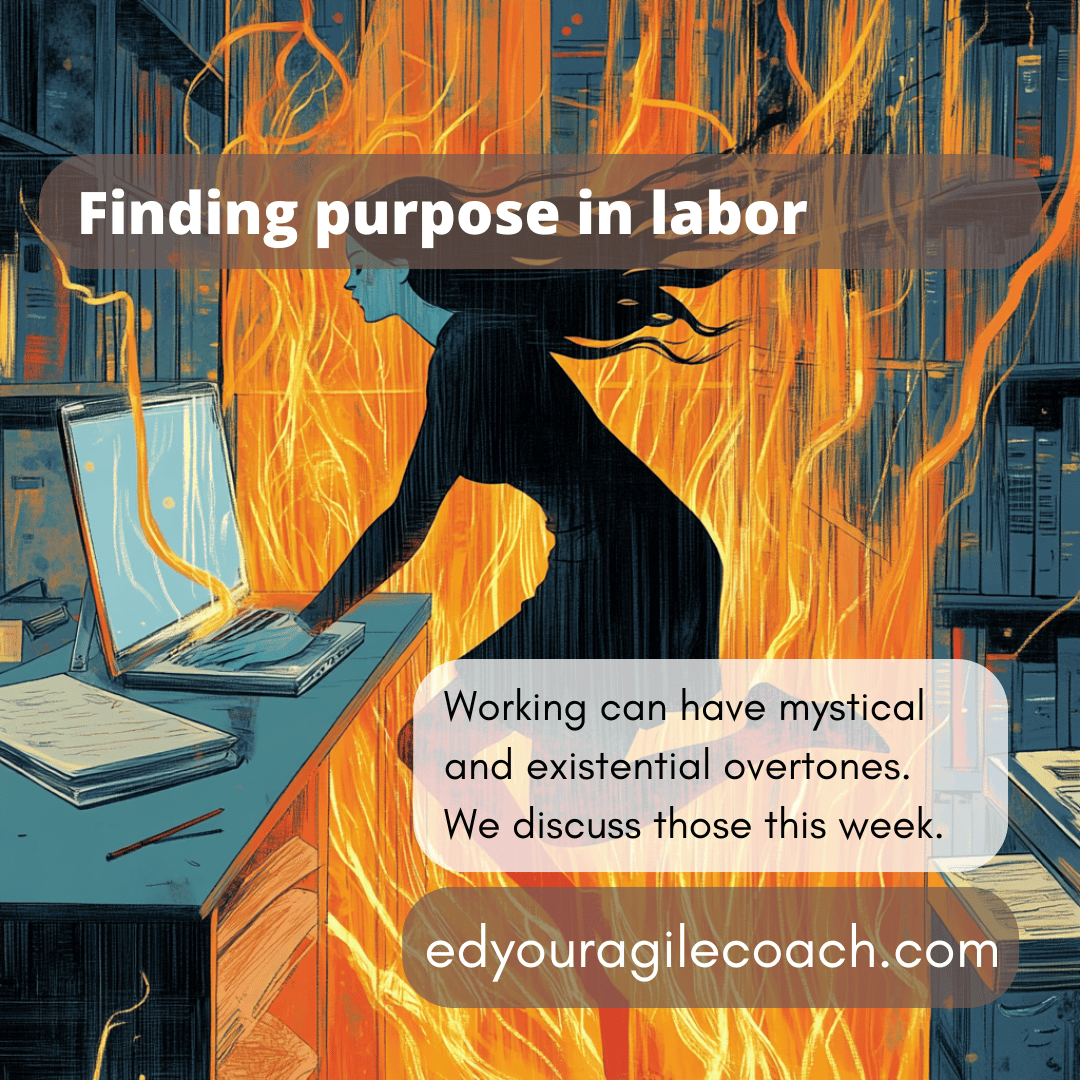The meaning of labor in an agile world.

The Labor Day weekend is called the official end of the summer season. The time between Memorial Day and Labor Day is not the astronomical summer season but the cultural one that most Americans, like me, accept. It is also the final mad dash to the general election for the Presidential race. I am very open about my desire to avoid discussing national politics. Many people on the political left and right write about the topic online better than me. I am more interested in the social dynamics of the office and workplace. We spend so much time at work that we should discuss it more. As a scrum master and Agile coach, I have devoted over ten years to improving work. In honor of the Labor Day weekend, I want to discuss my thoughts about labor and how it relates to the Agile reformation.
Early personal lessons about labor –
When you are a high school student, the word labor is one word that blends into the background during English class. It has a definition but not personal meaning until you start your first job. Unlike receiving a grade in the classroom when we labor, our time is valuable. We work a certain amount of time and receive a wage in return. Working provides a young person with their first sense of independence and cash. I remember hoarding money I made cutting grass to go to the local hobby shop and purchase Dungeons and Dragons products. Later, I would work at a summer camp, as a lifeguard, and as a local newspaper stringer. Each job gave me experience and spending money to help me be less dependent on my parents.
After receiving a job in radio after college, I understood the real meaning of labor. First, I was expected to be perfect on-air, according to the program manager. I also had production duties, and I would only get paid for them when I was on air. I made minimum wage and was on-air at a full-service AM radio station in rural Illinois. The truth was that my career was already dead. The radio station had no intention of making me full-time. I was making significantly less than my peers, and the station management knew I would put up with it because other college grads would gladly trade places with me. It was in the station manager's interest to keep wages low and expectations high while they attempted to make the radio station profitable.
Try as they might, they never made the radio station profitable, but I did receive a front-row seat to substance abuse in the media business, sexual harassment practiced openly in the office, and the general manager's girlfriend receiving a spot on the FM morning show, and the gigantic egos involved in advertising sales. At 23, I was a washed-up radio DJ—a college graduate with no career prospects and no means to support myself. My story is not unique; plenty of college graduates find themselves in conditions of under-employment and poor prospects when they finish college. I would kick around in various retail and hospitality jobs until I worked at Harrah's Casino dealing cards.
The casino gave me advanced education in what it means to labor. My time was not mine because I had to work when customers entered the casino. I spent time away from family and loved ones to breathe secondhand smoke and get drinks spilled on me. Pit bosses often reveled in the casually cruel treatment of dealers. They frequently told me to ignore ethical concerns and "dummy up and deal." Fortunately, I did experience positive leadership, and the weird hours and unusual clientele shaped my character. It also reinforced my values about servant leadership.
Working at Harrah's took me from working jobs to having a career with advancement. It would not last as the Indiana casinos undercut the Illinois business. Harrah's Casino unceremoniously threw me aside like a used facial tissue after a layoff. It was a bitter lesson because I had developed a personal loyalty to the organization, which the organization did not return when times got bad. I would never devote myself to a company the same way again.
In hindsight, it was one of the best things to happen to me. I leveraged my computer skills as an amateur. I took a few community college programming courses and embarked on a career in technology during the early days of the first internet boom. I have never looked back. My story is typical for people my age. We went to school, said no to drugs, and applied ourselves to a profession in an ambitious fashion to receive career instability. Our parents' social compact broke. As the global economy spun faster each day, many of us improvised the next chapter of our careers and family lives.
From the personal to the philosophical –
The most important lesson I learned while in the workforce is that my labor, whether dealing cards, writing software, or leading change initiatives, creates value for my organization. People convert the value into money. My employer pays me a wage and deducts the cost of materials, which leaves a difference known as profit. Any profit invested or saved becomes long-term wealth. In a healthy and virtuous system, businesses should operate symbiotically, helping the owners of companies and those who keep those businesses going through their labor.
Since the Industrial Revolution, capitalism has deviated from its original conception. Marx was the first to point this out with his labor theory of alienation. John Maynard Keynes shows that unfettered capitalism's boom and bust cycle demanded government intervention. More recently, politicians like Alexandra Ocasio-Cortez and Elizabeth Warren have pointed out that the social contract between business and society is in trouble.
Just as the past monarchies became insular, inbreed, and incompetent over the centuries for ruling Europe, so have leaders of capital and business in the twenty-first century. According to Forbes magazine, thirty billionaires under thirty did not create wealth but inherited it from their prosperous relatives.
It is a kind of capitalism that does not resemble unicorns magically creating wealth; instead, it is dragons who are bloated, fiercely territorial lizards wallowing on beds of gold. Combine this reality with the perverse incentives created by the shareholder value theory of business leadership, and you have a recipe for greed, exploitation, and abuse in the business world not seen since the days of David Copperfield. Many of us exist in this world of dragons hoping to avoid being trampled upon, set ablaze, or banished to confront poverty and starvation. We are the ones who aspire to earn some gold for ourselves and support a family. The price we pay is the sacrifice of mental or physical health. It is a sobering realization that you are not involved in a heroic journey through life but acting like a sniveling kobold helping preserve and grow a dragon's treasure.
Finding meaning in the dragon's den –
When I face this glum observation, I return to Viktor Frankl's book "Man's Search for Meaning." Frankl points out that our culture creates an existential vacuum in each of us. This situation is why many of us suffer from anxiety and neurosis. It is what drives people to substance abuse and others to religious fundamentalism. It is a simplistic formulation, but the most profound realizations are simplistic. Each of us desires a way to fill that space with us. Frankl points out three motivations that provide meaning in this contemporary life.
- Creating a work or doing a deed.
- Experiencing something and encountering someone.
- The attitude we take toward unavoidable suffering.
Our work fills the first need for meaning. Working, creating, and setting goals for ourselves is a principal way to avoid today's existential trap. Our families and loved ones give us meaning by providing the experiences and encounters that matter. Finally, the universe and our fellow humans are masterful at providing each of us plenty of unavoidable suffering.
It explains why I was so drawn to the agile reformation. I have no illusions about the beast I labor for in the dragon's cave, but I aim to make my work and the work of others more sustainable, satisfying, and sane. Work can provide dignity, wealth, and purpose if we try to find it. We can support our families with our labor and keep the dragons quiet. Unlike Marx, I believe in a postmodern capitalist economy where we can find meaning and that labor is a means to achieve it. So, this Labor Day, I am reflecting on my role in the global economy, and though I am a small piece, others will depend on me to make work valuable and meaningful. It is not a bad role to have in life.
Until next time.



Comments ()